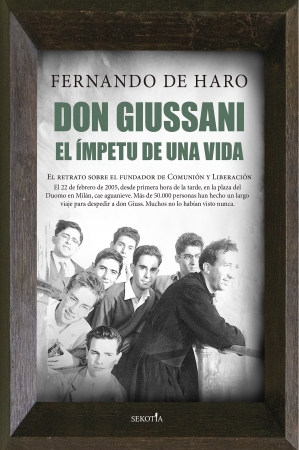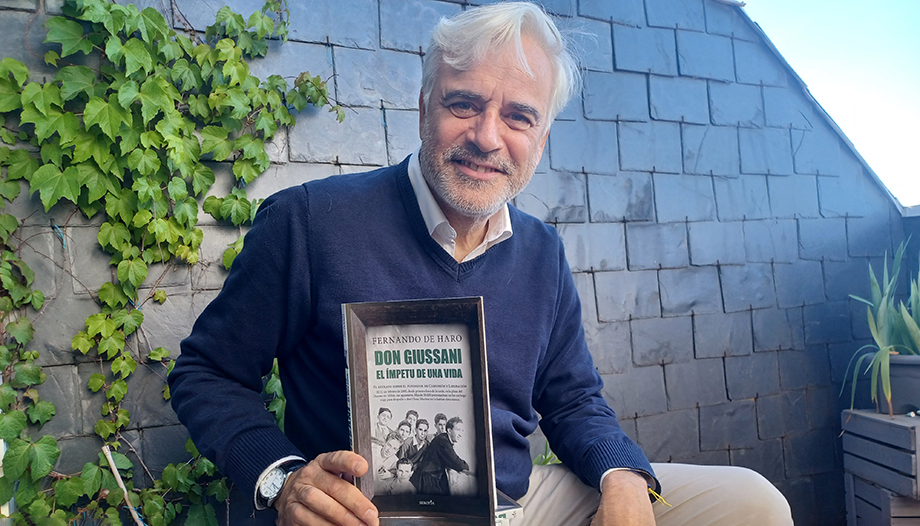A proposal for education in the Christian faithThis is how it is presented Communion and Liberationthe movement founded by the priest Luigi Giussani at the end of the 1960s.
Spanish journalist Fernando de Haro has just published the following article Father Giussani. The impetus of a lifea lively, agile and, at the same time, complete portrait of the figure of "Don Gius".
How did the idea of writing this biography of Luigi Giussani come about?
-I belong to Communion and Liberation and I personally met Giussani in 1985. I started in biography after Alberto Savorana did a great work of research that resulted in a biography of more than a thousand pages. Some people asked me for something more informative.
I did not want the reader to read a description of Giussani's life but to live with him, to know his reactions to the challenges he faced.
When I started to document myself I realized that it was oceanic, I told a friend and he advised me to keep what made me vibrate. That is how I have worked. The documentation work has had three axes: bibliographic, reading a lot of things; going to the places where Giussani has lived and talking to people who have had dealings with him.
What surprises me most is how Giussani learns from what happens to him, from experience. In fact, he has no intention of founding anything, but rather responds to circumstances that he lives as a vocation: "Everything in my life has been history."he will say.
I was struck by the way in which he put himself in front of the circumstances, whether it is the nostalgia he feels in the seminary, how he treats his students, who are already secularized, whether it is his illness or the revolt of '68.
The dialogue with the secularized society is equally current. How does Giussani develop this encounter with the world?
-Already in the 1950s, Giussani has the ability to understand that, even if the churches are more or less full, even if Catholic Action calls for more or less numerous demonstrations under that crust, many people have abandoned the faith because it does not really interest them in their lives. I think this makes Giussani's position very current. He does not take for granted that people know the faith, that they have had the experience of faith that gives rise to personal adherence.
Giussani presents faith as a response to the needs of each person, as a proposal that the one to whom it is presented must verify whether it makes him live life to the full. Faced with a world that, we can say, rejects God, Giussani does not place himself in a dialectical position. On the contrary, he underlines every valuable aspect of that reality. Christianity in Giussani does not confront the secularized world in a negative way, but welcomes all that there is in that world of longing, of aspiration, and redeems it from within. It already appears in his early writings and is maintained. He turns secularization into a great opportunity.
This is a very current option. It is increasingly difficult for Christianity to be maintained by pure tradition, as we see, and Giusanni responds to this by presenting faith as something that fulfills human desire.
If one word defines Giussani's life of faith it is event.
-Indeed, Giussani has an understanding of Christianity not as a doctrine, not as a set of notions or an ethic as a point of departure. Giussani understands Christianity as an encounter with a person, as an event. This is very original in Giussani. He comes to say that anyone can have the experience that the disciples had. This idea has been taken up subsequently, in fact, by the pontifical magisterium, Benedict XVI, in fact, begins his first encyclical saying this, precisely. And then Francis too.

Father Giussani. The impetus of a life
Communion and Liberation is characterized by this encounter with personalities of culture or other realities of the world that often seem antagonistic in their principles.
-Giussani liked to meet with people who were "alive," who were humanly alive, vibrant. In the first place, that conversation interested him humanly because he was interested in those people where the human vibrated with intensity. The second issue, for him, is that a person verifies that Christianity is true in the relationship with the other, not in a dialectical, defensive clash with the other or in a protective self-referentiality.
How is this freedom combined with obedience in the Church?
-Giussani keeps two poles always alive: obedience and freedom. And that is of great fruitfulness.
He lives a clear obedience to the Church, not a lazy obedience but based on the conviction that, without the bond with the Church, the contemporaneity of Christ is not guaranteed. Along with this, a great freedom. Giussani, without thinking about it, generates a reflection that later develops, above all, Ratzinger, which is the co-essentiality of the charism within the Church.
Thanks to experiences such as Communion and Liberation and other movements, there is no longer this dialectic between institution and charism or between parish and movement. The emergence of the movements provokes the Church to reflect. John Paul II went so far as to say that the charisms are coessential to the institution, that they vivify the institutions and that the institution itself is a charism. This is a very interesting thing that has not yet been fully digested. The opposite would be to return to the scheme that the hierarchy must always lead the initiative of everything in the Church, as it happens with Catholic Action, which is all very well but it is not the only thing.
How is the figure of Giussani to be drawn in the future?
-We run the risk of turning Giussani into a kind of intellectual when what is interesting about Giussani is the method. An educational method for the faith. The world will change and the challenges of faith will change-they have changed since 1968-but Giussani has left a method that allows several things. First, starting from experience, not in a subjective sense, but based on the fact that either faith is experienced as a source of intensity in life, of more humanity, or it does not resist.
The presence of Communion and Liberation in the cultural, working and socio-political environment is not born as a cultural project of conservation, but its purpose is the education of the faith... If a boy in the parish learns the Catechism but arrives at the institute and lives in a different way, he will end up losing his faith, because faith does not resist if it is not something that allows you to live in all circumstances. This method is based on have the experience as disciples that Christ responds to my heart and circumstances and become witnesses. That method remains essential. That is the Giussani of the present and of the future.









